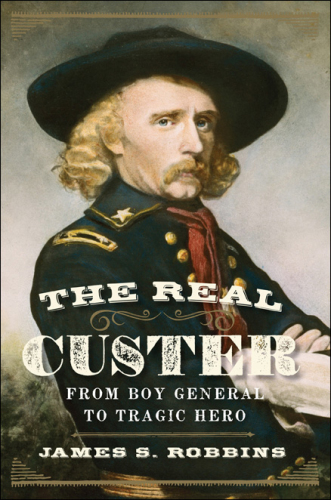
The Real Custer
From Boy General to Tragic Hero
کتاب های مرتبط
- اطلاعات
- نقد و بررسی
- دیدگاه کاربران
نقد و بررسی

May 5, 2014
Here’s another Custer biography, purportedly of the “real” man, as if other writers haven’t tried to capture that elusive “real” creature—but despite its redundancies, Robbins delivers a book about as free of cliché arguments as one can get. He avoids the cynicism and sneering that too often attend his subject to give a full, sympathetic, yet warts-and-all portrait of the man we’ve long known: last in his West Point class, impetuous, cocky, brave, foolish, insubordinate, violent, a born warrior who struggled to survive in peacetime, and, of course, the controversial chump of Little Big Horn. While Robbins (who’s written on Custer’s West Point class and on the Tet offensive) relates Custer’s life story well, he’s best at summoning the military and political context of the man’s life and acts, as well as the people key to Custer’s spectacular advances in rank and responsibility. For Custer himself, scarcely a subject crying out for more attention, Robbins can add little to what’s already been frequently told. Thus this addition to the list of existing Custer biographies merits attention principally for being the newest and for being written with verve while remaining fair to its subject.

August 1, 2014
George Custer (1839-76) is an American icon--written about, argued about, loved and derided since his debut as a lieutenant in 1861. Was he a gallant boy general and winner of countless cavalry battles, or a reckless commander who destroyed the Seventh Cavalry at Little Big Horn? Robbins (contributor, National Post and Washington Times; This Time We Win) attempts to tilt the balance with this latest biography. Brief sections on Custer's origins, followed by descriptions of juvenile hijinks at West Point (Custer graduated last in his class) set the stage for Robbins's portrayal of the soldier's success as a dashing cavalry commander and as a genuine hero in the Civil War. Custer's political forays, like his emotional connection to wife Libbie remain in the background, a little obscure even after extended treatment. The climactic battle is covered in a chapter, but other works have plowed that ground so extensively that little new can be said. The author's treatment leans toward the heroic American whose fatal flaw was cockiness and self-confidence. The work is heavily footnoted with extensive primary and secondary sources. VERDICT An accessible popular history well grounded in source material and presenting a favorable view of Custer that will be in high demand for historians and casual readers alike.--Edwin Burgess, U.S. Army Combined Arms Research Lib., Fort Leavenworth, KS
Copyright 2014 Library Journal, LLC Used with permission.

June 1, 2014
Deserved or not, it is the fate of George Armstrong Custer to be best remembered for his monumental failure, the entirely avoidable slaughter of himself and more than 200 members of his regiment at the Little Big Horn. Of course, there is much more to Custer's career and character, much of it laudable. Robbins, currently at the American Foreign Policy Council, is clearly out to balance the scales in this well-done project. Using a straight chronological approach, Robbins views the youthful Custer as high-spirited, friendly, and, surprisingly, studious. As a cadet at West Point, Custer's record was dismal, but Robbins sees youthful exuberance rather than laziness or lack of self-control. Custer's record during the Civil War was remarkable, both for his courage and the success of his aggressive cavalry maneuvers and charges. Yet, as Robbins point out, his aggressive moves could also be viewed as dangerously and unnecessarily reckless. There was clearly a tendency to be impatient and dismissive of conventional military wisdom in his tactics. Contrary to many recent historians, Robbins finds Custer's record as an Indian fighter to be admirable, but he acknowledges that his boldness and thirst for glory finally caught up with him at the Little Big Horn. This is a useful revisionist account of Custer's life.(Reprinted with permission of Booklist, copyright 2014, American Library Association.)

























دیدگاه کاربران